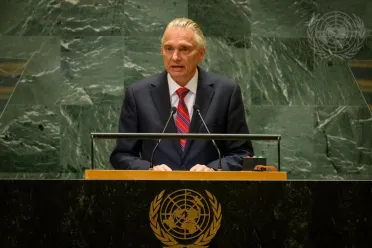Statement
Statement summary
ARNOLDO ANDRÉ TINOCO, Minister for Foreign Affairs and Worship of Costa Rica, said Latin countries are faced with the growing presence of drug trafficking and international organized crime as well as the triple planetary crisis of increasing poverty, inequality and widening gaps and asymmetries within countries and regions. “Meanwhile, our collective responses remain timid, delayed and insufficient,” he said, adding that only multilateralism, as the central approach to cooperation, will allow the international community to confront and overcome these challenges. “Democracy is the political system that embraces everyone,” he said. Venezuela cannot be considered a democracy as it expelled 8 million of its citizens and provoked an unprecedented migration crisis that affects the entire Western Hemisphere. In addition, thousands of people are crossing Costa Rica’s northern border daily to flee the dictatorship in Nicaragua. He urged the international community to not be indifferent to the humanitarian crisis in Haiti.
Criminal networks have found fertile ground for growth in Latin America and the Caribbean, whether due to corruption, lack of opportunities for youth or limited police capacity to counter them, impacting the security and well-being of local communities, with global repercussions, he said. He urged a coordinated, multilateral approach that uses information-sharing and strong legal measures to combat the networks. “Only through joint efforts can the structure of these organizations be dismantled, and ultimately, peace and security restored in the region,” he said. Peace lies at the heart of multilateralism and there is no peace without justice. He urged all parties to the many conflicts around the world to assume their obligations under international law, particularly international humanitarian law. Actors must comply in good faith with all decisions from international courts and the Council “because without justice, there will be no lasting peace”.
Warning that the current global financial architecture is at “imminent risk of becoming obsolete”, he called for a new, transparent, inclusive and sustainable model. Financing must be sufficient and concessional with effective debt relief mechanisms for developing countries. He also advocated for urgent capitalization of multilateral development banks and greater use of new and innovative financing mechanisms, such as green and blue bonds and debt-for-ecosystem services swaps. Middle-income countries and economies-in-transition, like Costa Rica, require flexible development financing tools suitable to their specific needs. He hoped the fourth International Conference on Financing for Development will generate concrete agreements through the necessary political will.
To ensure the well-being of future generations, “multilateralism must be blue”. Costa Rica has developed a strong blue diplomacy that recognizes the crucial role of oceans in the planet’s health. “To have a habitable planet, we need a healthy ocean,” he said, noting the ocean produces 50 per cent of the oxygen people breathe, is the world's largest source of protein, the greatest carbon sink and a climate regulator. Its biodiversity supports the livelihoods of 3 billion people worldwide. It is urgent that the new Agreement under the United Nations Convention on the Law of the Sea on the Conservation and Sustainable Use of Marine Biological Diversity of Areas beyond National Jurisdiction enters into force, he said. The international community must also wrap up an ambitious plastics treaty and ensure no deep-sea mining begins until there are guarantees that it will not harm the marine environment. He invited all delegates to participate in the third United Nations Ocean Conference, which Costa Rica and France will co-host in June 2025 in Nice.
Full statement
Read the full statement, in PDF format.
Photo

Previous sessions
Access the statements from previous sessions.
